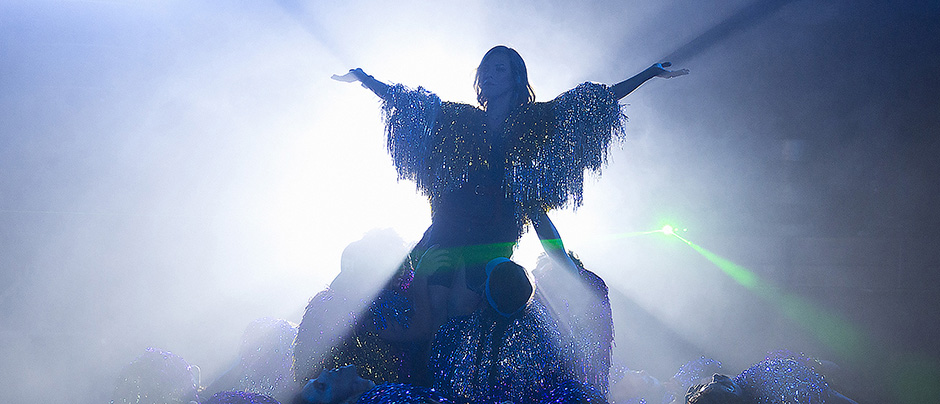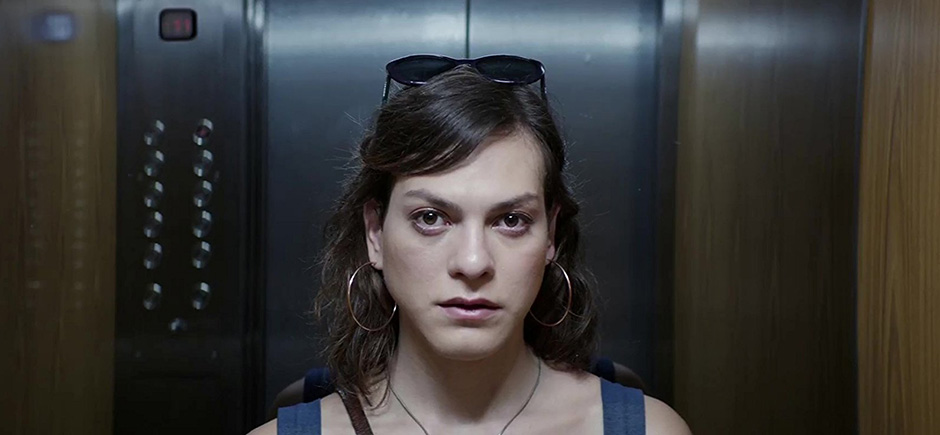Joyce Glasser reviews A Fantastic Woman (March 2, 2018) Cert 15, 104 min.
In his breakthrough film, Gloria (2013), then-35-year-old Chilean co-writer/director Sebastián Lelio and his actress Paulina Garcia created a glorious, invisible 50-something heroine without clichés or sentimentality. In his Academy Award nominated film, A Fantastic Woman (also co-written with Gonzalo Maza), Lelio shows us life from the perspective of another marginalised woman, Marina (played by the trans actress Daniela Vega).
The subject is topical, but the film is neither issue-based, sensationalist nor exploitative. It is instead a compassionate love story about an unconventional relationship that is neither forbidden nor accepted by society. The result is a masterly and courageous film and central performance, full of nuance, intensity, insight and beauty.
Matthew Herbert’s lovely, romantic but also unsettling electronic music plays over an aerial view of what we eventually perceive to be spectacular waterfalls. They are the Iguaçu Falls in Brazil, the largest in the world, and, we later learn, the destination for the surprise holiday for two that 57-year-old Orlando (Francisco Reyes), the owner of a small printing business, has just purchased.
The man dreaming of this natural wonder is in the Finlandia message parlour in Santiago, Chile. We follow Orlando back to his cramped office where he sets about searching for an envelope. It’s not in his car and his secretary reports that she has found nothing. Annoyed, but eager not to be late, Orlando heads for a nightclub where his adoring eyes settle on the singer, a woman half his age.
Waitress by day and nightclub singer by night, Marina (Vega) is singing a sad song, ‘Your love is like yesterday’s newspaper’, but it is not intended for the man watching her with a smile. There is something unusual about this woman that you cannot pinpoint. Like Orlando, you can’t take your eyes off of her.
Orlando has ordered a cake for Marina’s birthday and then announces the trip to the falls. They slow dance and return to his apartment where they make love. In the middle of the night Orlando awakens ill and then collapses. On the way to the car he falls down the stairs and bumps his head. At the A & E, Marina calls Orlando’s brother Gabo (Luis Gnecco), the only remotely sympathetic member of Orlando’s family. He tells her he’s on his way and that he will notify the rest of the family.
As Marina hurries away from the hospital, she is picked up by the police who question the name on her ID Card. Her legal name is still Daniel and Marina says the name change is pending. But Marina is now a criminal suspect as there is no witness to confirm her account of Orlando’s injuries.
A police detective (Amparo Noguera) subjects Marina to intimidating interrogations and humiliating physical examinations. Even the doctor is taken aback when Marina is ordered to strip and, as photos are taken, the detective refuses to leave the room. This scene is almost unbearable in its distressing cruelty and intensity, but Lelio’s camera is discreet and we only see what we need to in order to share Marina’s helpless anger and humiliation.
Orlando’s bitter ex-wife Sonia (Aline Küppenheim) cannot forgive her husband for leaving her for what the family consider an aberration of nature. Their thuggish son Bruno (Nicolás Saavedra) shows up to reclaim Orlando’s apartment, and he does not bother to knock. When he resorts to stealing the dog that Orlando had given Marina as a gift, she ignores friendly advice and goes after him.
Throughout her ordeal Orlando haunts Marina like a ghost, but though we see him, she can never quite reach him. Hounded by institutional prejudice and excluded from the funeral by Orlando’s spiteful family, Marina has to find a way to grieve and say goodbye.
But saying goodbye is not the end. She has to somehow find a way forward in life, so that she can be accepted for who she is. But even Marina is having trouble coming to terms with her identity. These emotions are expressed in DoP Benjamin Echazarreta’s expressive, and sometimes Hitchcockian, camera work; in the incredibly creative sound editing, and in various scenes that suggest Marina’s images of herself: a lonely walker soaked in the rain; a prostitute in a macabre bar; a wild animal straddling Sonia’s car and a dancer in a nightclub; covered in a cape of sparkling tinsel and sequins.
An unsettling thread runs throughout the film that is never made explicit. Marina finds a mysterious key that might contain an old coat; or an envelope containing a message from Orlando, a gift or a remembrance. By a coincidence late in the film Marina sees a man with the identical key and traces it to the Finlandia, where, relying on her ambiguous sexuality, she wanders through the men’s and ladies’ saunas to find the locker.
Like Gloria, A Fantastic Woman ends with a song, but in Gloria, the song was vibrant, upbeat, contemporary and clearly defiant. Marina’s astonishing performance of Ombra Mai Fu, on the other hand, will pierce your soul like the proverbial sword. The opening aria of Handel’s opera Serse is a lyrical prayer that is hard not to see as an appeal for Orlando’s memory and for Marina’s future. Let Fate smile upon you/May thunder, lightning, and storms/never disturb your dear peace/nor may you by blowing winds be profaned. It is perhaps no coincidence that this 18th century aria was originally performed by a castrato in the role of Xerxes, the King of Persia.
You can watch the film trailer here:







